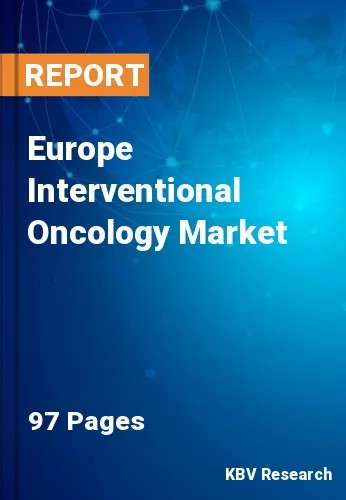The Europe Interventional Oncology Market would witness market growth of 5.8% CAGR during the forecast period (2022-2028).
The interventional oncology market is expected to increase in the future, as technological advancements have opened up a slew of new growth potential. Previously, most cancer patients had to go through a lengthy treatment process that included interdisciplinary treatments. This element posed a significant financial, emotional, and mental challenge for them. Interventional technology's super-selective tumour targeting and minimal injury to healthy tissues has demonstrated enormous potential to treat patients since technology has evolved. Interventional oncology is becoming more broadly utilized in cancer care due to technological enhancements, imaging developments, new contrast agents, and complicated navigation algorithms that have provided clinicians the accuracy to design therapies on the tumour.
Clinical trials of cancer medications have methodological guidelines and established main goals, however these are not always applicable to the clinical development of locoregional treatments and innovative medical devices. The present problem is to establish high-level clinical evidence for loco-regional therapies in order to determine patient advantages.
Lung cancer is the leading cause of mortality in Europe, responsible for roughly 20% of all cancer deaths and 3.2 million disability-adjusted life years lost each year. Lung cancer affects more than a quarter of those under the age of 60. Seven out of every eight patients die after five years of diagnosis, given current breakthroughs in surgery, chemotherapy, and radiotherapy. New findings in knowing the biology of lung cancer, on the other hand, have resulted in the development of potential novel targeted medicines. Lung cancer is caused mostly by smoking, which accounts for 90% of cases in men and 80% of cases in women. To reduce smoking and, as a result, the prevalence of lung cancer, consistent government effort is required.
Because many breast cancer cases in Europe are diagnosed early, many women may be able to receive breast saving surgery (BCT). Owing to the increase in the cases of breast cancer, lung cancer, liver cancer and prostate cancer across the world, the demand for numerous cancer treatments and solutions would spur across the region over the forecast period.
The Germany market dominated the Europe Interventional Oncology Market by Country in 2021, and would continue to be a dominant market till 2028; thereby, achieving a market value of $190.5 million by 2028. The UK market is estimated to grow at a CAGR of 5% during (2022 - 2028). Additionally, The France market would witness a CAGR of 6.6% during (2022 - 2028).
Based on Cancer Type, the market is segmented into Liver Cancer, Lung Cancer, Kidney Cancer, Breast Cancer, Prostate Cancer, Bone Metastasis, and Others. Based on Product Type, the market is segmented into Embolization Devices, Ablation Devices, and Support Devices. Based on End User, the market is segmented into Hospitals, Ambulatory Surgery Centers, and Research & Academic Institutes. Based on countries, the market is segmented into Germany, UK, France, Russia, Spain, Italy, and Rest of Europe.
Free Valuable Insights: The Global Interventional Oncology Market will Hit $2.9 Billion by 2028, at a CAGR of 6.2%
The market research report covers the analysis of key stake holders of the market. Key companies profiled in the report include Boston Scientific Corporation, Teleflex, Inc., Cook Medical, Inc. (Cook Group), Medtronic PLC, Terumo Corporation , Johnson & Johnson (Johnson & Johnson Services, Inc.), Becton, Dickinson and Company, AngioDynamics, Inc., Merit Medical Systems, Inc., and HealthTronics, Inc. (Altaris Capital Partners, LLC)
By Cancer Type
By Product Type
By End User
By Country
Our team of dedicated experts can provide you with attractive expansion opportunities for your business.

